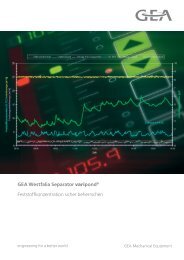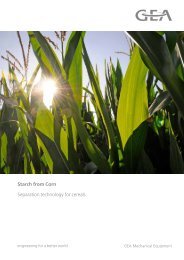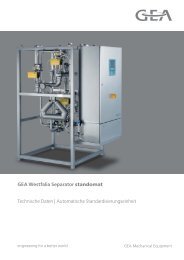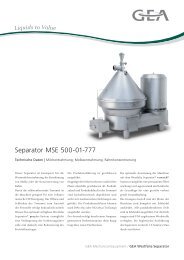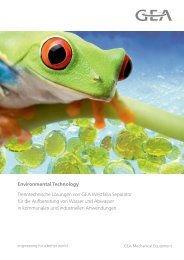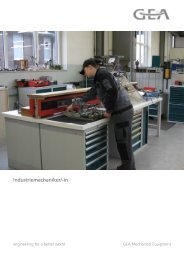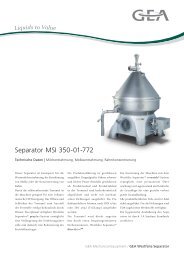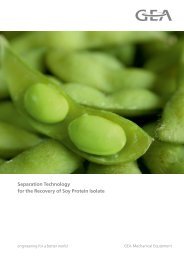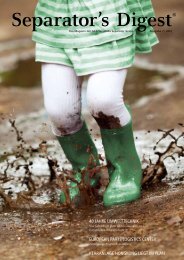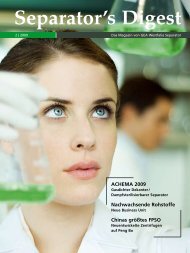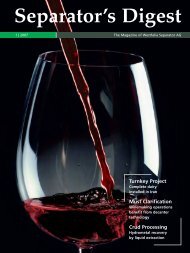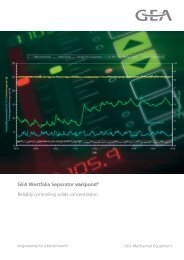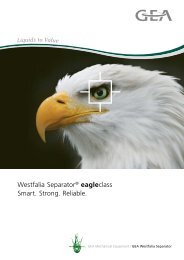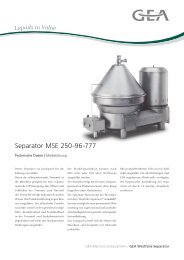Separator's Digest - GEA Westfalia Separator Group
Separator's Digest - GEA Westfalia Separator Group
Separator's Digest - GEA Westfalia Separator Group
Create successful ePaper yourself
Turn your PDF publications into a flip-book with our unique Google optimized e-Paper software.
we extract the colour from the skin of the<br />
grape and can go directly to the machine in<br />
a continuous process. We juice and<br />
immediately obtain the fermentable must<br />
from the decanter; it is initially hot. In a heat<br />
exchange process with cold mash, energy is<br />
recovered, and we can then lower the<br />
temperature of the must in a final stage so<br />
that we can go with a fermentation<br />
temperature of 18 °C directly with the red<br />
wine to the fermentation tank.<br />
<strong>Separator</strong>‘s <strong>Digest</strong>: How many employees<br />
do you need for operating the<br />
decanter line?<br />
In Badischer Winzerkeller, the decanter lines<br />
can be completely operated by two<br />
employees. In terms of manpower, we thus<br />
have an additional major advantage and, in<br />
terms of energy input, we also have major<br />
potential savings compared with our<br />
previous method of operation involving<br />
scroll type presses and various other work<br />
stages.<br />
Constantly better results<br />
than the scroll-type press<br />
<strong>Separator</strong>‘s <strong>Digest</strong>: How does the decanter<br />
perform compared with the<br />
scrolltype press and the tank press?<br />
When we saw what a decanter is capable of<br />
doing, we realised relatively quickly that it<br />
always provides better results than a scrolltype<br />
press. Some grape mashes may be<br />
juiced more easily with a tank press, and<br />
other grape mashes can be juiced more<br />
easily with a decanter. Overall, these two<br />
methods are of equal quality. however, the<br />
disadvantage of the tank press is that it<br />
requires a preclarification stage, either with<br />
a centrifuge or a flotation stage or a sedimentation<br />
stage. and with thermovinification,<br />
I cannot use continuous operation<br />
with a tank press because the mash first has<br />
to be heated and has to be kept in a tank<br />
for several hours in order to obtain a<br />
reaction time.<br />
Two thirds of production<br />
<strong>Separator</strong>‘s <strong>Digest</strong>: What volumes do<br />
you process in Badischer Winzerkeller<br />
with the <strong>Westfalia</strong> <strong>Separator</strong> vinex<br />
decanters?<br />
Wilfried dörr: today, decanters handle two<br />
thirds of our production. I am now in my<br />
fourth season at Badischer Winzerkeller,<br />
and we now have two production lines<br />
operating with decanters. everything which<br />
runs through the decanters lines is done<br />
without must preclarification. In the production<br />
process downstream of the decanter,<br />
we also have a flotation possibility<br />
which we can run directly after the process.<br />
and we also do this in certain cases,<br />
depending on the mash which we have.<br />
Otherwise, after the decanter, there are no<br />
more centrifuge operations. We still use<br />
centrifuges for must clarification for our<br />
tank press installation. We will continue to<br />
retain this process for the time being,<br />
particularly also for relatively small batches.<br />
and for absolute peak days, we also have a<br />
scroll-type press which will also continue to<br />
be used in order to cope with the peaks.<br />
Earning its spurs<br />
<strong>Separator</strong>‘s <strong>Digest</strong>: Is <strong>Westfalia</strong><br />
<strong>Separator</strong> vinex now accepted and<br />
established in the wine industry?<br />
Wilfried dörr: the wine industry has now<br />
accepted that this technology works, but<br />
the level of acceptance is still not complete.<br />
Wine growers have been pressing grapes<br />
for 5000 years, irrespective of pressing system.<br />
now somebody comes along and says<br />
we no longer need to press. that is not<br />
easy. however, there were also difficulties<br />
experienced in the move away from the<br />
wooden cask to a stainless steel tank. Or in<br />
the move away from kieselguhr filtration to<br />
crossflow filtration. even the initial use of<br />
the centrifuge in the 1950‘s and 1960‘s did<br />
not take place overnight. technologies<br />
which are new always have to earn their<br />
spurs for many years before they are<br />
accepted. I make no exception for myself in<br />
this respect.<br />
<strong>Separator</strong>‘s <strong>Digest</strong>: In addition to<br />
the <strong>Westfalia</strong> <strong>Separator</strong> vinex process,<br />
Badischer Winzerkeller also uses centrifuges<br />
from <strong>GEA</strong> <strong>Westfalia</strong> <strong>Separator</strong><br />
for clarifying the young wines.<br />
Wilfried dörr: We have several irons in the<br />
fire at our company in this respect. the<br />
traditional method is clarification using a<br />
centrifuge and subsequent kieselguhr<br />
filtration. alternatively, this can today also<br />
be achieved only with clarification via<br />
crossflow filtration installations. In general,<br />
we use the traditional method for the white<br />
wines and the crossflow method of<br />
Gea <strong>Westfalia</strong> <strong>Separator</strong> Process for the red<br />
wines. however, it is no longer possible to<br />
conceive of wine clarification without<br />
centrifuges.<br />
35 million bottles per year<br />
<strong>Separator</strong>‘s <strong>Digest</strong>: What quantities do<br />
you produce every year?<br />
Wilfried dörr: We produce around 35 million<br />
bottles per year. this year, we expect to<br />
receive around 30 million kg of grapes from<br />
our full suppliers and also several million<br />
litres of must which we source from our<br />
partial suppliers. as Badischer Winzerkeller,<br />
we offer a range of around 150 wines;<br />
however, for other cooperatives and winemaking<br />
operations, we produce up to 600<br />
different wines. It is true that we are a large<br />
operation; however, for us it is no problem<br />
at all to make 200 litres of a special harvest<br />
in the same way as 1.2 million litres of wine<br />
from Baden grapes.<br />
<strong>Separator</strong>‘s <strong>Digest</strong>: Thank you very<br />
much for the interview.<br />
Today, <strong>Westfalia</strong><br />
<strong>Separator</strong><br />
vinex decanters<br />
handle two thirds<br />
of the production.



